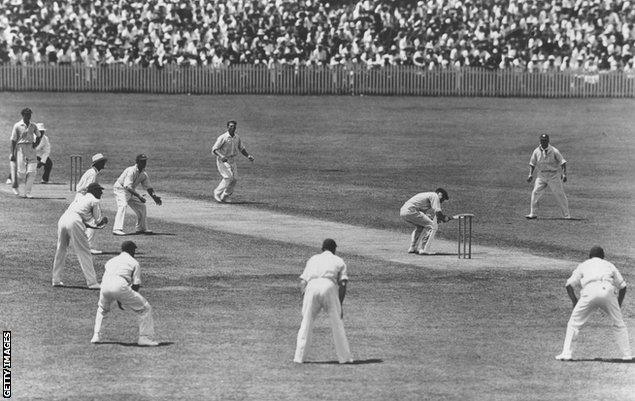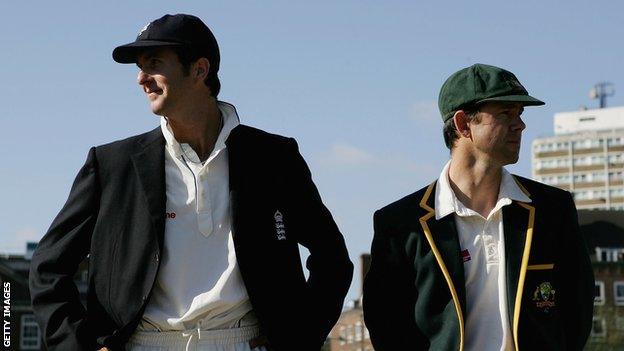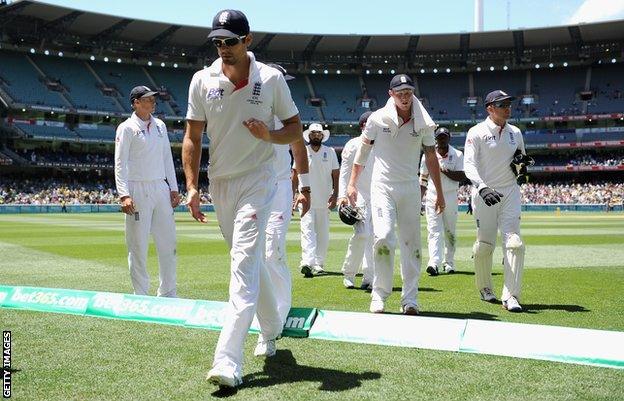Ashes 2019: The strategy, stress and secrets of captaining England and Australia
- Published
- comments

"There's Test cricket and there's Ashes cricket. The two are completely different."
So says Andrew Strauss, who, as one of only three England captains to win the Ashes both home and away, knows what he is talking about.
As England's Joe Root and Australia's Tim Paine prepare to put themselves through almost seven weeks of intense scrutiny, countless decisions and sleepless nights, Test Match Special has taken a special look at the role of the skippers in cricket's oldest rivalry for a podcast that can be downloaded now and will be broadcast on BBC Radio 5 Live at 20:00 BST on Tuesday.
What goes on inside the mind of an Ashes captain?

Motivation - 'Retaliating for my grandfather'
Naturally, the desire to win the biggest prize in Test cricket, knock off your oldest rivals, become a national hero and etch your name into sporting folklore is all part of the motivation going into an Ashes series.
Dig a little deeper, though, and skippers who have lifted the urn, whether wearing Three Lions or 'baggy green', have found personal inspiration beyond rivalry, prestige and adulation.
For Strauss, who gloriously won down under in 2010-11, it was the memory of sharing a lift with travelling England fans during the 5-0 defeat four years earlier and being told he was a "disgrace".
Michael Vaughan, who famously led England to victory on home soil in 2005, took his drive from interactions with the Australia team.
"In 2002-03, I was part of a side that lost 4-1," he says. "After we beat them in the last Test at Sydney, we were in their dressing room, having a beer and talking.
"One or two comments came back from the Australians that we played the game poorly, our mindset was all wrong and county cricket was useless. I felt they were talking down to us and being a little bit disrespectful.
"I remembered those conversations when I got the job of captain."
Ian Chappell was Australia skipper when England were mercilessly attacked by the fearsome pace of Dennis Lillee and Jeff Thomson in 1974-75.
The destruction of the English was not just about an Ashes win for Chappell, but also revenge on behalf of his family for the most infamous series of them all - Bodyline.

England sparked controversy with their aggressive bowling tactics during their 1932-33 'Bodyline' tour of Australia
"My grandfather, Vic Richardson, was vice-captain of Australia and he wanted to retaliate against England's tactics, but captain Bill Woodfull was a gentleman," says Chappell.
"Many years after he wanted to do that, there I was with Lillee and Thomson.
"I thought: 'Hey, Vic, we've just retaliated for you.'"
Planning - Taking the wives out to dinner
In an attempt to outmanoeuvre your fiercest opponent, the planning is meticulous, exhaustive and lengthy.
"You have the start date in your mind for quite a long period of time," says Alastair Cook, who led England to home Ashes series victories in 2013 and 2015.
"Although Joe Root has been playing in the World Cup, he will have always known when the first day of the Ashes is. As soon as it gets announced, you start the countdown."
For Vaughan, it went back to the moment he was given the job.
He says: "Nasser Hussain walked into the dressing room at Edgbaston on the last day of the Test against South Africa in 2003 and said: 'You're going to be Test captain.'
"That night I had dinner with Duncan Fletcher, the coach, and said: 'Right, 2005.' I didn't even think about the other series. We had a two-year plan leading into 2005."
Strauss had already lifted the urn on home soil in 2009, but describes winning in Australia in 2010-11 as the "holy grail".
His planning even included the involvement of the players' wives and girlfriends, taking them out to dinner to explain what to expect on the tour down under.
"If they aren't happy, it comes back to the players," Strauss explains. "We wanted to say to the girls that they had a huge role to play in this."
Strauss' desire to include players' partners is an example of how the role of an Ashes captain has changed over time.
Former Australia skipper Allan Border had a different approach. Ban them.
"I'd been on two previous tours to England, in 1981 and 1985. When the girls turned up, the focus of the players changed," says Border, who led Australia to wins in England in 1989 and 1993.
"One night I got back to the hotel and Wayne Phillips was walking up and down the aisle with a screaming baby. He was the not-out batsman. I thought: 'This isn't right, he's got to bat tomorrow morning.'
"It was a decision spawned out of those observations. The players quietly supported it, but when the girls were around they told me it was a terrible idea."
Interaction - 'I gave them the cold shoulder'
For an Ashes skipper, there is only one other person who knows what you are going through during that series - the person you are trying to defeat.
The nature of cricket captaincy makes for regular meetings with your opposite number. Handshakes at the toss, side by side in the post-match presentations. Keep an eye out for Root and Paine somehow trying to get a hand each on a tiny replica urn for publicity shots.
There is, then, the question of how you choose to interact with the opposition. Not just the captains, but the teams as a whole. Friendliness or indifference?
Modern cricketers have much more opportunity to get to know each other in global Twenty20 tournaments - Jonny Bairstow and David Warner have been opening the batting together in the Indian Premier League.
That is a contrast to days gone by. Border was one of very few familiar Australians thanks to stints with Essex in 1986 and 1988. But to him, no Englishman could be a friend during the 1989 Ashes.
"I had to have a harder edge to how I approached playing against England," he says. "I knew a lot of the guys so well - David Gower, Mike Gatting, Ian Botham, Graham Gooch.
"I wanted to see what the reaction would be if I gave them the cold shoulder. I was civil, but not chummy. I didn't go for drinks or dinner."
If that worked for Border - Australia won 4-0 - Vaughan took the opposite approach in 2005.
Recognising that he was coming up against one of the greatest Test teams, and conscious of the mystique surrounding Australian cricket following almost two decades of Ashes dominance, he encouraged his players to get to know their opponents.
"When we toured in 2002-03, the only time we were allowed to drink with them was after the series," says Vaughan. "Nasser Hussain's method was not to know them or speak to them.
"My style was wanting our players to know them. If you only looked at their numbers, they could feel like aliens and you might wonder how you could beat them.
"When you get to know them, have a beer and understand that they are good guys, you realise they are just human beings."

England's Ashes victory over Australia in 2005 was their first since 1986-87
Demeanour - 'If he can cope, I can cope'
As captain, you are not only a team's leader, tactician, motivator and man-manager, you are also the public face, spokesman and ambassador.
Put simply, you are your team personified and the image you portray can give an indication of the serenity, or lack of it, in the dressing room.
During the Bodyline controversy of 1932-33, when England caused outrage and blurred the lines of fair play with a barrage of short-pitched fast bowling designed to intimidate the home side, Australian hatred towards touring captain Douglas Jardine was fuelled by his ever-present Harlequin cap.
More than 40 years later, albeit in a series down under when the Ashes were not on the line, Mike Brearley grew a beard to "roughen his exterior". Whereas Jardine's England won, Brearley's men lost all three Tests.
"You have to stay level," says Vaughan. "The most important part of that is dealing with the media, because the players will be listening to everything you say.
"Your job as a captain is to portray that there is nothing wrong and everything is calm."
It was a method Cook tried to adhere to, even when he was presiding over a 5-0 defeat in Australia in 2013-14.
In conversation with Vaughan, he says: "I took this from you. Sunglasses and floppy hat, never showing any emotion. I tried to do that in that series, even though things were falling apart.
"I got to the stage when I thought, 'I need to be the captain that is still rock-solid' - even though underneath I was absolutely devastated it was happening on my watch.
"Sometimes people look at you and think: 'If he's coping, I can cope.' And I tried to be that."
Losing - Being sledged by the prime minister
For every captain who lifts the urn, there will be disappointment, devastation and, occasionally, humiliation for the losing skipper.
Because of a quirk of the schedule in 2013, Cook found himself in charge of back-to-back series against Australia. A winner in August, the Ashes were relinquished by December.
Not only that, but a once-great team disintegrated. Graeme Swann retired, Jonathan Trott was never again the same player and Kevin Pietersen was banished. Coach Andy Flower departed too.
"That was a tough eight or nine weeks as a player and as a captain," says Cook. "We ran into Mitchell Johnson and a side playing at the peak of their powers, and we were slowly falling apart.
"We had won the Ashes in Durham and my whole family were there - my mum and dad, my wife Alice and her mum and dad. It was disbelief that you've just won the Ashes as captain. Then we handed them back over."
When Australia were beaten on home soil in 1986-87 under the stewardship of Border, they were even being sledged by their own prime minister.
"We'd been hammered by England at the MCG inside three days," Border explains. "Afterwards, we were watching the Davis Cup final on the TV - Australia v Sweden.
"Pat Cash came back to beat Mikael Pernfors and Australia won the thing. In the presentation, Bob Hawke said: 'It's a pity there weren't 11 of Pat Cash at the MCG today.'
"It went down like a lead balloon and we were all lobbing beer cans at the telly. The trouble is, it was true.
"We won the next Test in Sydney."
Both Border and Cook redeemed themselves. Following the jibe from Hawke, Australia won the next eight Ashes series. For Cook, the urn was regained 18 months after the whitewash down under.

Alastair Cook's England side were beaten 5-0 by Australia in 2013
Winning - 'You'll be bloody happy'
For all of the planning, posturing and politics, it may be that the ultimate destination of the urn is beyond a captain's control.
"You can have the best-laid plans, but they are 1% things," says Vaughan.
"Captains always talk a bit of nonsense, but fundamentally it's about good enough players. Yes, you need a plan - but you need that element of luck."
And, although Vaughan, Cook, Strauss, Border and Chappell are separated by hemispheres, eras, success and failure, their advice to Root and Paine is consistent: focus on nothing but winning.
Endure the sleepless nights, be unpopular with your team-mates (and their partners), talk nonsense in the press and pretend everything is OK - even when it isn't.
Do it all to get your hands on the Ashes.
"The easiest way to be a well-liked captain, especially when you tour, is to lose," says Chappell.
"You might not be popular if you win, but you'll be bloody happy."

Men's Ashes 2019: England v Australia, first Specsavers Ashes Test |
|---|
Dates: 1-5 Aug Time: 11:00 BST Venue: Edgbaston |
Coverage: Ball-by-ball Test Match Special commentary on BBC Radio 5 live sports extra, Radio 4 LW, online, tablets, mobiles and BBC Sport app. Live text commentary on the BBC Sport website. |